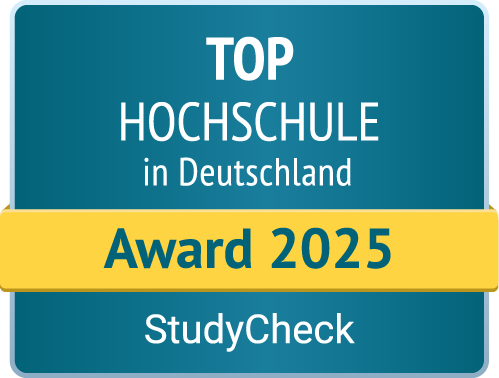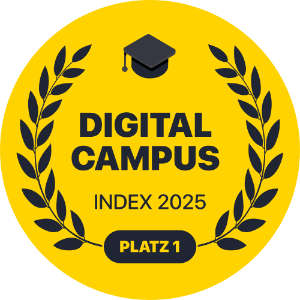Faculty of Media
Multimedia media production (MMP)

Study overview
Nowadays, the requirements for success for media professionals are undoubtedly many-faceted. They are expected to master media technology or journalistic craft for as many different types of media as possible (print, online, radio, TV), to have pronounced technical and specialist knowledge as well as communication and social skills. In the journalistic field, precision in perception and reproduction, comprehensibility, faithfulness to facts and well-founded research - including critical ability and independence - are demanded. All this should also be accompanied by knowledge of media law and intercultural contexts in order to guarantee professional success in increasingly cross-media and decentralised media companies.
The Master's programme in Multimedia media production provides a practical, project-oriented education, incorporating current trends and digital technologies.
In small groups, in modern equipped laboratories (writing workshop, TV studio, sound studio, photo studio as well as laboratories for video editing and computer and layout graphics) our students become familiar with professional standards of hardware and software and realistic editorial or production processes.
An example of one of the successful projects of the course is www.frankensein.de (German)
| Short form | MMP |
| Type of study | Full time |
| Standard period of study | 3 semester |
| Award | Master of Arts (M.A.) |
| Start of studies | Winter semester & summer semester |
| Admission restrictions | Specific |
| Lecture location | Ansbach |
| Language of instruction | German |
| Course management | Prof. Renate Hermann |
| Student advisory service | Prof. Renate Hermann |
| Student Services | studierendenservice.mik(at)hs-ansbach.de |
Admission requirements
- A university degree or equivalent in a degree programme comprising at least 180 ECTS credits in the fields of:
- Multimedia/Communication
- journalism/public relations
- Media production/media design
- TV/Film
- media informatics/media technology or similar
- with a final grade from the undergraduate degree of at least 2.5 or better.
- The Master's degree programme MMP already requires practical knowledge in the field of multimedia. Therefore, proof (see HERE) of publications/samples of work or completed internships or training periods must be submitted with the application.
Study structure
The focus of the MMP master classes is the structure of a project-oriented education, e.g. in the form of teaching edits and productions. In the Central Project Modules (45 ECTS points), mainly study projects are realised that have a strong application reference and in which the students acquire professional competences as well as the ability to work in a team. Examples are:
Students learn and train qualifications regarding project-oriented work in the modules for project-specific competences (10 ECTS), e.g. project management, strategic topic and organisational management in editorial offices, scientific work.
The dynamics of new technical and content-related developments in the media sector are extreme and also require corresponding consideration or anchoring of the latest innovative trends in the curriculum. Future-oriented applications and technologies should be taught in corresponding compulsory modules.
Depending on the project orientation, individual know-how in the area of soft skills/key qualifications (5 ECTS) and in the area of additional skills/additional qualifications can be acquired in addition to the compulsory modules by taking the compulsory elective modules, e.g. interview/moderation under live conditions, crisis communication, rhetoric, charisma in leadership positions.
Another special feature of the degree programme is that at least one e-learning elective module (5 ECTS points) from the Virtual University of Bavaria (www.vhb.org) or a comparable e-learning offer - e.g. MOOCs (Massive Open Online Courses) - must be successfully completed for the Master of Arts degree.
The qualification for scientific work is proven by the Master's thesis (15 ECTS points) as the final paper.
Applications
Applications can only be made online via the Ansbach University website.
Registration winter semester from 02.05., registration summer semester from 15.10., the final dates for the respective application periods can be found in the current announcements.
Further Information

Various modules of the MMP Master (e.g. rhetoric, crisis communication, charisma in leadership positions) can be credited for a business coach certificate. Additional modules, taken on a voluntary basis, which are offered in the field of various coaching methods, can be acquired as part of the MIK Master's programme.
Graduates of the MMP Master's programme in Multimedia media production have acquired the necessary skills and knowledge during their studies which are required in - in part completely new - professional fields in the media sector. They distinguish themselves as all-rounders with regard to the use of different media platforms, know the specific requirements of editorial and multimedia work in the print, online, TV or mobile sector, but can also work cross-medially, virtually and interculturally.
The diversity of the degree programme is reflected in the career prospects. Employers particularly appreciate the broad basic knowledge and practical skills of the graduates.
The design of the programme profile also takes international standards into account, so that graduates can apply and implement the skills they have acquired in an international environment.
In addition to traditional professions in the media sector, numerous new occupational fields related to the digitalisation of the media are opening up.
Staff

Prof. Renate Hermann, M.A.
Studiengangsleitung Multimediale Information und Kommunikation (MIK) / Vorsitzende Prüfungskommission Multimediale Information und Kommunikation (MIK)
0981 4877-234 Retti 022 (Rettistraße 56, 91522 Ansbach) nach Vereinbarung rhermann vCard
Prof. Renate Hermann, M.A.

Studiengangsleitung Multimediale Information und Kommunikation (MIK) / Vorsitzende Prüfungskommission Multimediale Information und Kommunikation (MIK)
Funktionen:
- Studiengangsleitung Multimediale Information und Kommunikation (MIK)
- Studiengangsleitung Multimediale Medienproduktion (MMP)
- Vorsitzende Prüfungskommission Multimediale Information und Kommunikation (MIK)
- Professorin Multimedia und Kommunikation (MUK)
- Professorin Ressortjournalismus (RJO)
- Wissenschaftliche Leiterin Pixel Campus
Vita:
Nach dem Studium der Kommunikationswissenschaften, Biologie und Psychologie an der Ludwig-Maximilians-Universität München langjährige Erfahrung als Medizin-Journalistin (u. a. „Die Neue Ärztliche“/ FAZ, „International Medical News“) Filmautorin für Gesundheitsmagazine im BR und der ARD („Die Sprechstunde“, „Ratgeber Gesundheit“, „Report“, „alphamed“), Redakteurin „Bleib Gesund" (SAT 1), Dokuserie in Kooperation mit der Weltgesundheitsorganisation, WHO („Traditional Ways of Healing“), Stv. Chefredakteurin „Health Online Service“ (Burda / Bertelsmann) und Programmdirektion für medizinische Spartenkanäle (IP-TV)
Lehrt seit 1998 an der Hochschule Ansbach in den Bereichen Multimedia und Kommunikation sowie Telemedizin.
Schwerpunkte im Rahmen der Professur (seit 1.11.1999): Konzeption und Realisation von Printtiteln, Internetportalen und Multimedia-Projekten, Cross-Media-Marketing, Digitale Videoproduktionen für Industrie, staatliche bzw. kommunale Einrichtungen und Lehre, Weiterbildung von Akademikern (Zweitstudium und Ärztefortbildung)
Aufbau und Leitung des Studiengangs „Ressortjournalismus“ (Start Wintersemester 2008/09), Masterdozentin/DIZ, Mitglied der Programmkommission der Virtuellen Hochschule Bayern (vhb)
Ausgewählte Beispiele für realisierte und betreute Internetportale:
- Bayerisches Staatsministerium für Wissenschaft, Forschung und Kunst (www.stmwfk.bayern.de)
- Kulturportal Bayern (www.kulturportal-bayern.de)
- Bayerischer Bauernverband (www.bayerischerbauernverband.de)
- Landkreis Ansbach (www.landkreis-ansbach.de)
- Jugendportal Bayern (www.jupo.bayern.de)
- Studieren in Bayern (www.studieren-in-bayern.de)
Videopodcasts (z.B. für):
- Bayerisches Staatskanzlei / Ministerpräsident (www.bayern.de)
- Bayerisches Staatsministerium für Wissenschaft, Forschung und Kunst (www.stmwfk.bayern.de/Videos)
- Bayerisches Staatsministerium für Umwelt- und Gesundheit (www.mediathek.bayern.de)

Ralph-Peter Kappestein
Leiter Studierendenservice der School of Business and Technology (SBT)
0981 4877-143 BHS 3.02 (Brauhausstraße 15, 91522 Ansbach) nach Vereinbarung ralph-peter.kappestein vCard
Ralph-Peter Kappestein

0981 4877-143
BHS 3.02 (Brauhausstraße 15, 91522 Ansbach)
nach Vereinbarung
ralph-peter.kappestein
vCard
Leiter Studierendenservice der School of Business and Technology (SBT)
Funktionen:
- Leiter Studierendenservice der School of Business and Technology (SBT)

Prof. Dr. Markus Paul
Professor Multimediale Information und Kommunikation (MIK)
Prof. Dr. Markus Paul

Professor Multimediale Information und Kommunikation (MIK)
Funktionen:
- Vizepräsident
- Professor Ressortjournalismus (RJO)
- Professor Internationales Management (BIM)
- Professor Multimediale Information und Kommunikation (MIK)
- Professor Multimediale Medienproduktion (MMP)
- Studiengangsleitung Medienwirkungen und Medienpsychologie (MUM)
- Stellvertretender Vorsitzender Prüfungskommission Multimediale Information und Kommunikation (MIK)
- Stellvertretender Vorsitzender Prüfungskommission Ressortjournalismus (RJO)
- Hochschulsportbeauftragter
Lehrgebiete:
- Crossmedialer Journalismus
- Medienethik
- Sport-Journalismus
- Medien-Wirkungsforschung
Vita:
- Prof. Dr. Markus Paul war zuletzt Mitglied der Chefredaktion der Nürnberger Zeitung. Dort leitete er den Newsdesk und war zuständig für das zentrale Nachrichtenmanagement sowie die Blattplanung und -aufmachung. Zudem betreute er die Jahresrückblicke und publizistische Sonderprojekte. Zuvor war er nach seinem Redaktionsvolontariat lange Jahre Redakteur im Politikressort der Nürnberger Zeitung.
- Markus Paul hat Geschichte und Germanistik an der Friedrich-Alexander-Universität Erlangen-Nürnberg studiert (Magister Artium). Nach seinem Studium promovierte er in Neuerer Deutscher Literaturwissenschaft und forschte und lehrte als wissenschaftlicher Mitarbeit an der Universität Erlangen am Lehrstuhl Prof. Dr. Verweyen.
- Seit März 2012 lehrt er als Professor an der Hochschule Ansbach im Studiengang Ressortjournalismus.
- Er ist zudem Rezensent der Online-Zeitschrift "r:k:m - rezensionen: kommunikation: medien" (http://www.rkm-journal.de/archives/16183).

Prof. Dr. Ismeni Walter
Professorin Multimediale Information und Kommunikation (MIK)
Prof. Dr. Ismeni Walter

Professorin Multimediale Information und Kommunikation (MIK)
Funktionen:
- Professorin Ressortjournalismus (RJO)
- Professorin Multimediale Information und Kommunikation (MIK)
- Professorin Multimediale Medienproduktion (MMP)
- Frauenbeauftragte Fakultät Medien
- Mitglied Fakultätsrat Medien
Tätigkeitsfelder:
- Umweltjournalismus
- Neue Medien
Vita:
Ich bin seit 1999 freie Wissenschafts- und Umweltjournalistin mit Schwerpunkt audiovisuelle Medien. Vor meiner Berufung an die Hochschule Ansbach lag mein Lebensmittelpunkt in Köln, wo ich u. a. für die TV-Wissensredaktionen des WDR (Quarks & Co, W wie Wissen, Kopfball, Planet Schule u.v.m) und für freie Produktionsfirmen im Edutainment-Bereich gearbeitet habe. Zu meinen Auftraggebern zählten außerdem verschiedene Hörfunkredaktionen (u.a. WDR 5 Leonardo, DLF Forschung Aktuell, dradio wissen) und die Bundeszentrale für gesundheitliche Aufklärung. Daneben habe ich regelmäßig moderiert (Veranstaltungen der Wissenschaft im Dialog gGmbH und des Deutsche Museums Bonn, Podiumsdiskussionen für verschiedene Landes- und Bundesministerien und Forschungsinstitute). Aktuell arbeite ich mit der Redaktion „IQ – Wissenschaft und Forschung“ des BR (Bayern 2) und mit der Längengrad Filmproduktion GmbH, die TV-Dokumentationen und Magazinbeiträge für ARD, ZDF und ARTE im Themenfeld Wissenschaft, Umwelt und Medizin produziert, zusammen.
Mein Studium (Biologie) habe ich an der TU München absolviert. Darauf folgte ein Jahr Forschung an der Harvard Medical School in Boston, und danach meine Promotion auf dem Gebiet der marinen Ökotoxikologie an der Universität Hamburg und der Meeresstation Helgoland des Alfred Wegener Instituts für Polar und Meeresforschung. Bereits während Studium und Promotion begann ich, journalistisch zu arbeiten. Dank eines Stipendiums der Studienstiftung habe ich danach in einem Praxisjahr in verschiedenen Hörfunk- und Fernsehredaktionen mein Können vertieft und mich anschließend als freie Journalistin in Köln niedergelassen.
Seit 2011 lehre ich an der Hochschule Ansbach im Studiengang Ressortjournalismus: zunächst als Lehrbeauftragte, und seit 2014 als Professorin.
2024 erhielt ich von der Unicum Stifung die Auszeichung „Professor des Jahres”.
Meine Forschungsinteressen liegen im Bereich Repräsentation von Expertise in den Medien und Narration in XR-Medien.

Alexander Erb
Laboringenieur Multimediale Information und Kommunikation (MIK)
Alexander Erb

Laboringenieur Multimediale Information und Kommunikation (MIK)
Funktionen:
- Technischer Referent Fakultät Medien
- Laboringenieur Multimediale Information und Kommunikation (MIK)
- Laboringenieur Public Relations und Unternehmenskommunikation (PUK)
- Laboringenieur Ressortjournalismus (RJO)
- Mitglied Fakultätsrat Medien
- Lehrbeauftragter
- Apple Certified Trainer
- Personalratsvorsitzender
Tätigkeitsfelder:
- EDV-Betreuung
© 2025 Hochschule Ansbach



